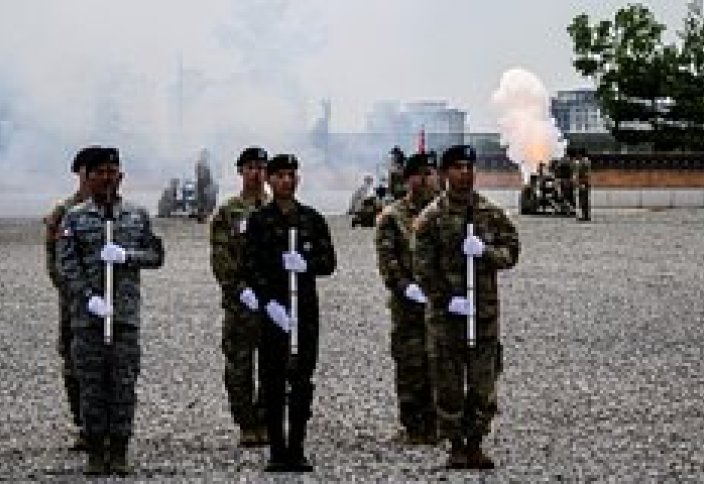|
Германия возобновит воинский учет и введет новую модель военной службы
|

Коалиция консервативного блока Христианско-демократического и Христианско-социального союзов и Социал-демократической партии Германии намерена возобновить воинский учет, мониторинг, а также ввести новую модель военной службы. Об этом сообщает газета Welt со ссылкой на исполняющего обязанности министра обороны Бориса Писториуса.
Отмечается, что новая модель будет основана на добровольном участии. По словам Писториуса, в первый год действия новой программы бундесвер рассчитывает принять на службу около 5 тысяч человек дополнительно.
«Как только законодательный процесс будет завершен, мы сможем принять и обучить первых призывников», — сказал он.
И.о. главы Минобороны ФРГ заявил, что Германия намерена играть важную роль в Европе как крупнейший партнер НАТО.
Ранее глава Союза военнослужащих ФРГ Андре Вюстнер заявил, что Германии необходимо увеличить численность армии, иначе бундесверу грозит коллапс. По его словам, с 2022 года объем поручений резко вырос, но набор и удержание персонала за этим не поспевают, несмотря на отдельные небольшие успехи.
Германия планирует добровольную военную службу
Бундесвер срочно нуждается в наборе новобранцев, и это вызвало дебаты о возможном возвращении к призыву. Тем не менее, военная профессия изо всех сил пытается привлечь молодежь.
Новая коалиция правоцентристской консервативной Христианско-демократической партии и Христианско-социального союза (ХДС/ХСС) и левоцентристской Социал-демократической партии (СДПГ) призвала к постепенному возвращению к воинской повинности в Германии.
Однако социал-демократы выступают против обязательной службы — они выступают за добровольную службу. Это особенно верно в отношении исполняющего обязанности министра обороны Бориса Писториуса (СДПГ), который, скорее всего, сохранит свой пост в новом федеральном правительстве.
Так, вероятный будущий канцлер Германии, лидер ХДС Фридрих Мерц во время презентации коалиционного соглашения заявил: «Мы будем усиливать военную службу в Германии по шведскому образцу — сначала на добровольной основе».
Следование шведской модели означало бы рассылку анкеты всем 18-летним в данном году. Ответы на вопросы анкеты являются обязательными для мужчин и добровольными для женщин и включают в себя вопросы о пригодности и готовности служить в армии. Ответы помогут определить, кого пригласят для прохождения военного медосмотра.

"The idea is to select those who are the fittest, most suitable, and most motivated for military service," said Pistorius about his proposal last year.
This is essentially aimed at re-establishing a "military registration system," something Germany abandoned when it ended conscription in 2011.
A military registration system is designed to collect information on all citizens of military age, including data on age, health, abilities, and military experience — all of which is crucial for a potential call-up to military duty. Without it, Pistorius says, the state would not know who should be drafted in the event of a crisis.
Another goal is to make military service more attractive. The coalition agreement optimistically states: "Respect through demanding service, combined with opportunities for qualification, will continuously increase willingness to serve in the military."
Обязательная военная служба существовала с 1957 по 2011 год
Conscription was suspended in 2011. The number of Bundeswehr service men had been continually decreasing ever since the end of the Cold War, when the army had half a million soldiers. Rather than focusing on national defense, it was then mostly focused on foreign missions. And for that it needed experienced troops — not 18-year-old soldiers drafted for a mere six months.
Today's security situation is once again fundamentally changed. Russia's war against Ukraine; hybrid attacks on NATO members; and the US government's disengagement from Europe — all of that has bolstered Germany's determination to improve its military position. That will include supplying more weapons to the Bundeswehr, for which the future German government has allocated significant funds. But it also wants to increase the number of soldiers on duty.
Currently, the Bundeswehr has just over 182,000 active service members. But it lacks pilots, IT specialists, and electrical engineers, among others. While it has plenty on offer — including a wide range of training programs, free train travel in uniform and free medical care, very few young people are applying for jobs. There are too many alternatives on the German labor market, as it struggles with a shortage of skilled workers. The CDU/CSU and SPD are hoping the Bundeswehr will become more attractive, once young people encounter the subject of national defense in the questionnaire.
Сколько призывников может интегрировать Бундесвер?
Then there is also a pragmatic issue underlying the future government's reliance on voluntary military service: the Bundeswehr would not be able to accommodate and train all eligible candidates in Germany, due to a lack of infrastructure — in particular, accommodation and training facilities.
The army currently has 15,000 available spots for voluntary military service — around 10,000 of those are filled. The army could only comfortably accept an additional 5,000 voluntary soldiers, according to Carsten Breuer, Inspector General of the Bundeswehr, who adds: "We need potential for growth."
Breuer warns that if too many conscripts were recruited all at once, the Bundeswehr's operational readiness could suffer. A tank commander cannot train conscripts, and also "maintain operational readiness for his battle on NATO's eastern flank," he explained, during a discussion held at the German Council on Foreign Relations (DGAP).
Should the new German government's approach to military service — which it describes in the coalition agreement as "initially based on voluntary participation" — fail, it could easily return to universal conscription. It was merely deactivated by law in 2011, not removed from the German constitution.
However, conscription would only apply only to men. In order for it to also apply to women, the Basic Law would need amending. And that would only be possible with a two-thirds majority vote in the Bundestag.
Эта статья изначально была написана на немецком языке.
Пока вы здесь: Каждый вторник редакторы DW подводят итоги того, что происходит в немецкой политике и обществе. Вы можете подписаться здесь на еженедельную рассылку новостей по электронной почте Berlin Briefing.
Author: Nina Werkhäuser













